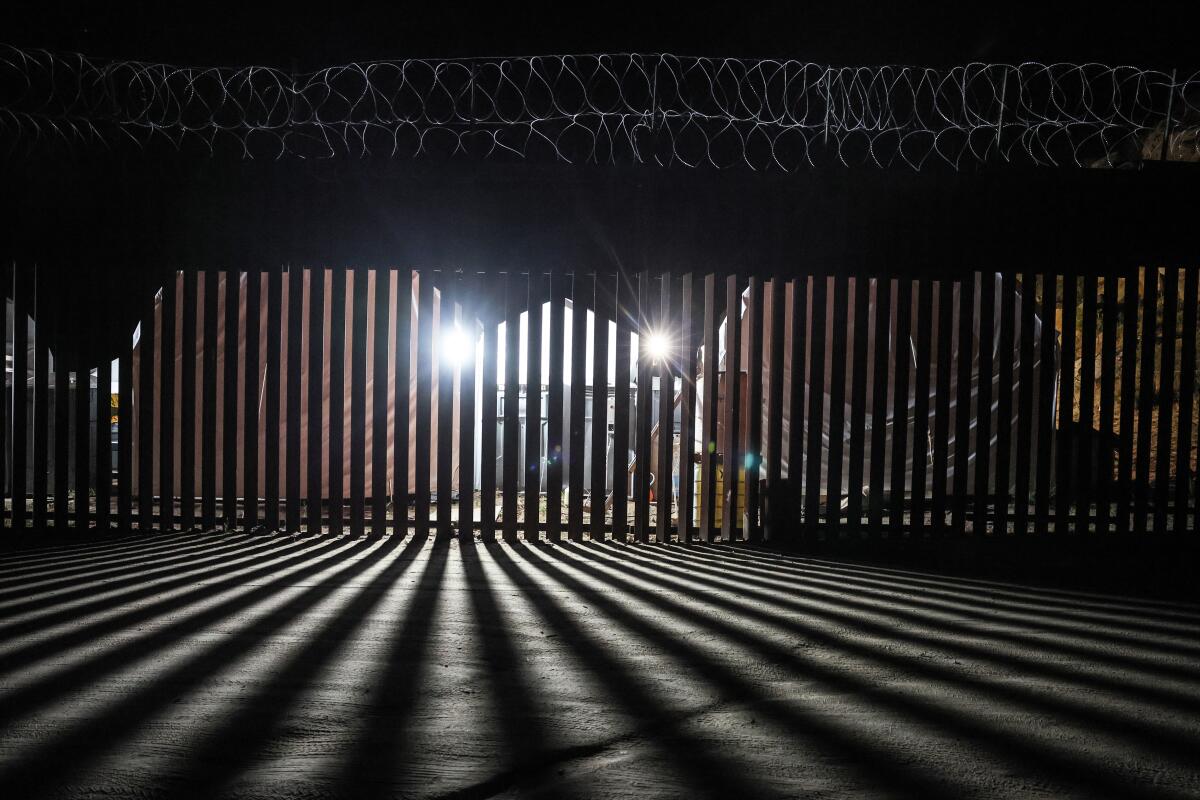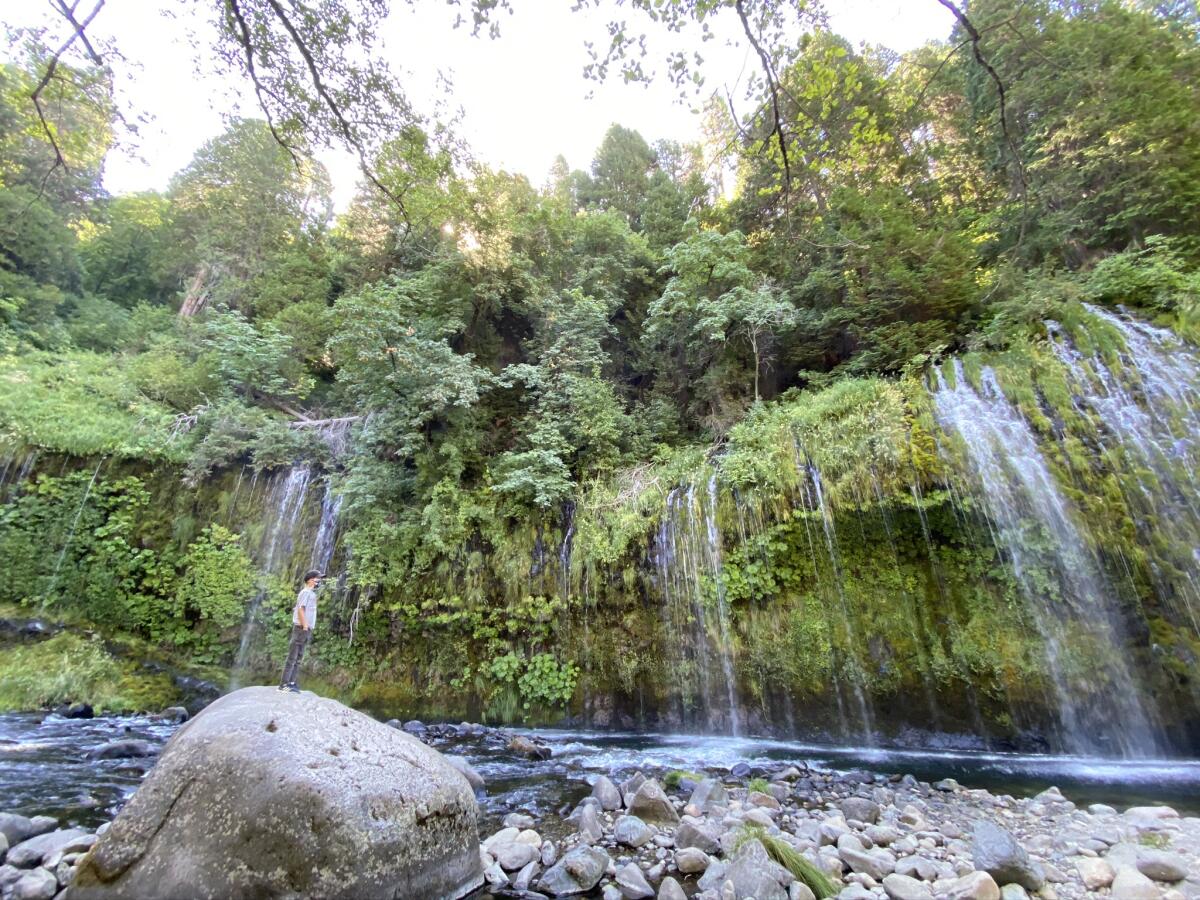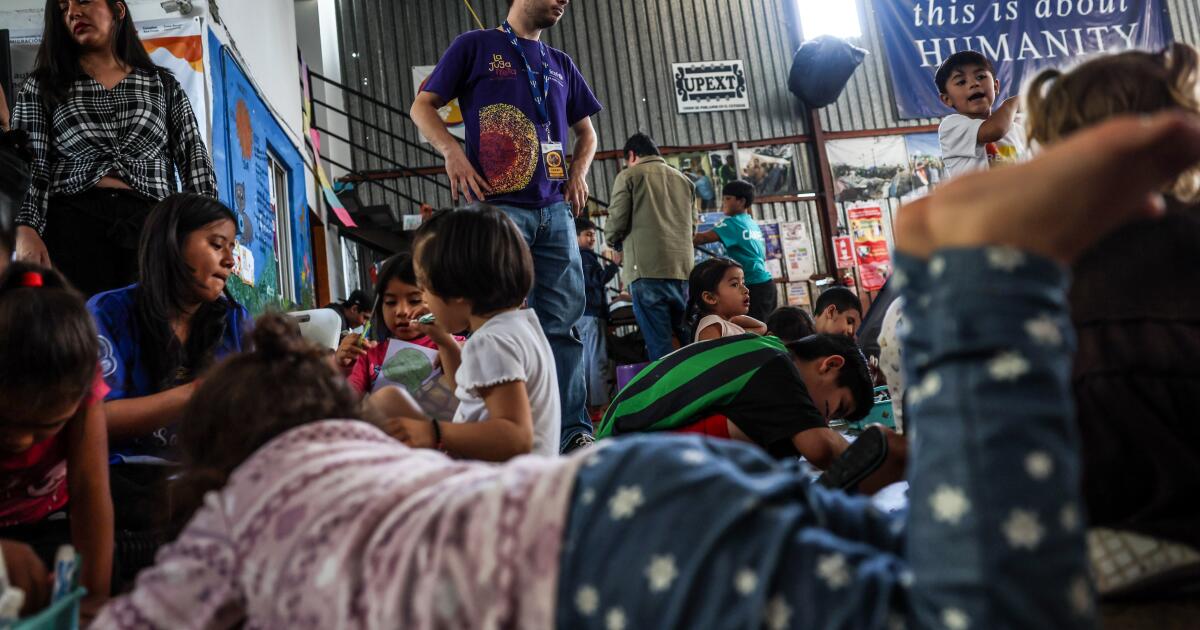Good morning. It’s Monday, June 24. I’m Andrea Castillo, who covers federal immigration policy for The Times. Here’s what you need to know before you start your day.
Newsletter
You are reading the Essential California Newsletter.
Our journalists bring you the biggest news, features and recommendations every morning
Please enter your e-mail address
sign up
You may occasionally receive promotional content from the Los Angeles Times.
These migrants arrived at the California border just as Biden announced his new asylum order.

The temporary military base next to the Mexican border wall is meant to prevent migrants from entering the United States through a gap in the nearby fence.
(Robert Gautier/Los Angeles Times)
I met Ze, a 27-year-old from China, earlier this month at the San Ysidro transit center, where he and other migrants had been dropped off by Border Patrol after crossing into the U.S. illegally.
I was there to cover the situation shortly after the Biden administration issued an executive order raising the legal threshold for asylum claims and barring entry to people crossing the border illegally if apprehensions exceed an average of 2,500 a day.
The move runs counter to domestic and international law, which allows people to apply for asylum regardless of how they entered the US. But immigration is at the top of the presidential election campaign and polls show many voters are concerned about it.
Migrants arrived exhausted and confused about how the process would work, and many had not heard about the changes.
San Diego, where most migrants from China arrive, recently surpassed Texas as the top area for migrant arrivals along the southern border for the first time in more than 20 years.
The Border Patrol said preliminary data since Biden’s announcement shows apprehensions are down 25%, and May figures showed the third-lowest number of arrests of any month during Biden’s term.
Like other Chinese migrants, Ze traveled to Ecuador, then passed through Central America and Mexico before reaching the southern border of the U.S. But starting next month, Chinese nationals will no longer be able to enter Ecuador without a visa, a move that could drastically reduce the number of Chinese nationals allowed into the U.S.
Ze, who asked to be referred to by a nickname due to fears of persecution as a Muslim member of the Hui ethnic minority, was taken into federal custody just before Biden’s order took effect.
But he didn’t arrive at the California-Mexico border alone: His brother was missing.
So Ze did what is common for immigrants separated from their families: He waited outside the transit center all day.
There are no public toilets, but a nearby grocery store allows migrants to use them if they make a purchase, and there is little free food, apart from the occasional pizza or snacks brought over by volunteers or aid groups.
Border Patrol often separates families during the process. Reunification often occurs within a few days, but can take weeks. In some cases, some family members are released into the U.S. while others are deported.
At the transit center where migrants are dropped off, humanitarian organizations escort them to local trams and show them how to use the free public transport to the airport, while licensed and unlicensed taxis also await customers willing to pay exorbitant fares.
Ze had no idea if or when his brother would be released. As the Border Patrol bus pulled up to another transit center, he watched hopefully for his brother to come out. But he never did.
Ze, who worked as a translator and spoke five languages, including Hindi, befriended Sam Patel, a man from India who was waiting for his wife.
The two walked to a nearby Cricket Wireless store, where Patel bought a cell phone – like many other migrants who had been robbed on their way to the border.
In a rare moment of solitude behind the shop, Ze knelt on the concrete and said his third prayer of the day.
Patel finally got through to his wife, who had been staying overnight at a shelter, with his phone ready to go. She arrived soon after by taxi, and the two shared a tearful embrace.
By 8 p.m., Ze left with a heavy heart to join them at San Diego International Airport, where the Patels were scheduled to board a flight to South Carolina shortly, while Ze spent a sleepless night at baggage claim with others who had been unable to get into local migrant shelters.
The next morning, he returned to the deportation center to await his brother’s release, where they were reunited that afternoon.
After another sleepless night at the airport, a friend booked them flights to New York, where they met up with other Chinese immigrants in Flushing.
Ze said he looks forward to practicing Islam openly with Eid al-Adha, one of the major Islamic holidays, approaching. His next steps are to find a lawyer, apply for asylum and get a job.
Today’s Top News

(Zoe Cranfill/Los Angeles Times)
Escape from Hollywood
Wildfire season is upon us
Welcome to Giant Rock
COVID-19 cases rise in summer
The most influential Los Angeles residents are:
Other big news
Get unlimited access to the Los Angeles Times. Subscribe here.
Today’s Recommended Articles

(Patrick Ruby/Los Angeles Times)
What is the “shadow self” and why is everyone talking about their hidden desires? A concept created and coined by Carl Jung has become the latest buzzword in self-discovery on social media.
Other recommended articles
How can we make this newsletter more helpful? Send your thoughts to [email protected].
During breaks

Dodgers fans are enjoying themselves at the speakeasy located under the right field pavilion at Dodger Stadium.
(Wally Scalisi/Los Angeles Times)
Go out
Stay at
And finally… great photos
Tell us your favorite place in California. Send us your iconic California photo and it could be featured in Essential California.

Today’s great photo was provided by Bronwyn Jamrock of Culver City: Mossbrae Falls in Dunsmuir.
Jamrock wrote, “I never knew California could be like this. So much water and greenery. California never ceases to amaze me.”
Have a great day! Yours, The Essential California Team
By Andrea Castillo
Karim Doumar, Head of Newsletter
Check out the top stories, topics and latest coverage at latimes.com.

